
Related
Guests
- Antonia Juhaszjournalist covering COP21 for Newsweek. Her latest article is “Suicidal Tendencies: How Saudi Arabia Could Kill the COP21 Negotiations in Paris.”
- Kumi Naidooexecutive director of Greenpeace International.
- Asad Rehmanhead of international climate for Friends of the Earth.
“How does a country negotiate its own perceived demise? This may be the most pertinent question to consider when pondering the role of Saudi Arabia at the United Nations 21st Conference of Parties in Paris,” writes journalist Antonia Juhasz in a new piece for Newsweek. “The simple answer is that it does not. Instead it undermines and blocks those negotiations and their goal wherever possible.”
Transcript
AMY GOODMAN: Antonia Juhasz, you have written an article for Newsweek, “Suicidal Tendencies: How Saudi Arabia Could Kill the COP21 Negotiations in Paris.” You see another force here.
ANTONIA JUHASZ: This is not to say Saudi Arabia to the exclusion of other governments—the United States, for example—but that—
AMY GOODMAN: And, of course, Saudi Arabia is an ally of the United States.
ANTONIA JUHASZ: Exactly. But that Saudi Arabia is also playing a key role in trying to derail the negotiations. And, you know, that’s of course not particularly surprising. The world’s largest producer of oil, 16 percent of the world’s reserves, also a country that 90 percent of its export income comes from oil, this is clearly a very significant issue for Saudi Arabia. And they are using their influence, among the Arab Group, among the Gulf Cooperation Council and just in the negotiations themselves, to put up roadblocks, slow things down, water things down, make it so that it is not as meaningful of an agreement that it needs to be.
AMY GOODMAN: Just to explain the reason it matters—I mean, it is not surprising that a large oil-producing nation would be opposed to limits on greenhouse gas emissions, but the U.N. works by consensus—why Saudi Arabia has so much, like the United States, power here to block?
ANTONIA JUHASZ: Well, it’s a sort of interesting form of consensus. It’s consensus that tends to only be utilized when it’s large powers that are offering a bloc. It’s a—I would call it an informal consensus process. And so, there is the ability for large powers to put in wedges. And on the 1.5-degree point in particular, Saudi Arabia, leading the Arab Group, has taken a stand against the 1.5, and it’s adamant against the 1.5. Saudi Arabia has also taken a stand against the emerging economies putting up more money to pay for all of the needs that we’ve heard articulated. So that’s [inaudible] trying to get China and India and others to put up more money. And Saudi Arabia has used that point as a place to say, “Well, we’re not going to do that, and until you take that off the table, we’re also not going to look at putting in long-term goals. We’re not going to look at these critically important reviews of everyone’s climate plan,” that are ideally supposed to start happening right away and after five years. They said that needs to be off the table. And these are very important, watering down—”watering down” is almost too weak of a word—just severely weakening what could come out of the agreement. But there’s an interplay between these powers, right? And so, this is a negotiation, and they’re using each other to take things off the table that they don’t want to have on the table.
AMY GOODMAN: You point out in your piece that Saudi Arabia has its own COP21 Facebook and Twitter pages featuring a photograph of solar panels in the desert. They denied human-connected climate change—I’m not talking about the Republican presidential candidates in the U.S., but the Saudi delegation—for a long time. They’re accepting that now?
ANTONIA JUHASZ: Absolutely. And in fact, you know, I would say, within the delegation, there is a tremendous amount of awareness about the severity of climate change and its impacts on their country and their region, which is actually why I entitled the piece “Suicidal Tendencies,” because there is an—you know, you can’t ignore the dramatic increases in heat, dust storms, sea level rise, the impacts on agriculture.
AMY GOODMAN: Didn’t a report just come out that said in the Gulf states you’re not going to be able to stay outside for more than a few hours soon?
ANTONIA JUHASZ: Exactly. And the impact of that on conflict obviously is something that is felt very real within this delegation and within this group. However, they will say that, and then they’ll also say, “We can’t get off of this resource.” And they will also say, “We’re investing in alternative energy. We’ve submitted our individual climate plan. We’re looking at renewables.” But when I asked a representative of Saudi Aramco, you know, what that really means, which is the Saudi oil company, I was told, you know, “Yes, we’re investing in alternative energy, and that will reduce our greenhouse gas emissions, but that’s for domestic energy consumption so that we’re able to produce more oil to export.”
AMY GOODMAN: And this deal that Amnesty International said was made about dropping language, the U.S. dropping language around gender equity and human rights, and Saudi Arabia agreeing to drop language around occupied peoples that the U.S. didn’t want? Do you know about this?
ANTONIA JUHASZ: I didn’t know about this deal being reached. I mean, this was a very important paragraph that was about establishing, within the meaningful portion of the text—so I don’t know if this has been moved into the preamble. A lot of the fight was over keeping it in the operable language, Article 2. And one of the things that happened was that it was moved into a preamble, which makes it non-legally binding. And this was asserting women’s rights, the rights of workers, indigenous rights. And then Saudi Arabia had inserted the rights of peoples in occupied territories—not that most of us would disagree that that’s an important thing, but to put it in as a poison pill to keep the United States and Israel from being able to include this paragraph.
AMY GOODMAN: From wanting to include the paragraph.
ANTONIA JUHASZ: From wanting to include the paragraph.
AMY GOODMAN: So what happens now, Kumi Naidoo? You were just at a session here calling for people to take to the streets, that the real action won’t take place inside the COP, but outside? I mean, we’re in a state of emergency right now in Paris, France, that will end, right, the day after the U.N. climate summit ends, but people are defying that?
KUMI NAIDOO: Well, firstly, it’s important to note that most of us in civil society never said “the road to Paris,” we always said “the road through Paris,” because we know that many of our governments are heavily controlled and influenced by the interests of oil, coal and gas companies. We knew that the so-called interim—the INDCs, where—the targets that have come up, was way below what we need. So we have always said that come the day after the COP, the struggle continues, that we have to fight the struggle on multiple levels. It’s going to need peaceful civil disobedience. It’s going to need litigation. And I’m pleased to say today on Human Rights Day, in the Philippines, the Philippine Human Rights Commission has formally started an investigation against 60 of the top carbon companies in the world, with the view of litigating for the impacts that the people in the Philippines have experienced. We have to go after not just the oil, coal and gas companies, but the very funding institutions—banks and hedge funds and so on—that actually fund these companies. So, we announced today that a coalition of organizations is going to intensify our resistance moving forward, and that in the course of next year we’re going to see mass civil disobedience around coal plants, on oil pipelines, on various fossil fuel infrastructure.
AMY GOODMAN: And the issue legally of forcing polluters to pay, Asad Rehman?
ASAD REHMAN: So, I think there are two issues here. First of all, polluters, of course, have to pay. But the biggest polluters are, of course, countries. So corporations are not created. They’re not mythical entities. We create them, and they’re regulated by our states. So the key question is also that we have to be careful that we’re not just talking about corporations, but we’re talking about our governments, because it’s our governments that have the legal and moral responsibility. What we don’t want to get into is where corporations think they can continue to pollute as long as they pay a fine. And we’ve seen that, of course, with the tobacco industry and other industries, as well. What we really need to see is regulation, deep cuts, emission cuts, and a move away from our pollution—polluting, dirty energy towards renewable energy and clean energy and peoples’ energy.
But let me just also—can I just come back on—the one interesting thing about the human rights issue here is, of course, that the United States has not ratified any human rights statute internationally. So it is also using it as a poison pill to try and divide developing countries. And what we’re seeing here is a real big game of divide and rule, of trying to pick off the most vulnerable. We’ve heard it time and time again, that the poorest countries are being rung, capitals are being rung. They’re being told, “You have to blame other developing countries.” And we’re being set up for an argument about survival versus development, when, in reality, we should be setting up a conversation about the rich elites’ pattern of consumption and their lifestyle against the majority of the world. This is the 1 percent versus the 99 percent.
AMY GOODMAN: I want to thank you all for being with us. We will be here tomorrow covering the end of the COP, though it may not end tomorrow. Asad Rehman of Friends of the Earth, Kumi Naidoo of Greenpeace, and Antonia Juhasz, a journalist covering the COP here for Newsweek. We’ll link to her piece, “Suicidal Tendencies,” as well as all of the position papers that groups have been putting out.
I’ll be speaking here in Paris Friday night at 9:00 p.m. at The Place to B. That’s 5 rue de Dunkerque near Gare du Nord. The talk will be also live-streamed. For information, you can go to democracynow.org. And for our full coverage of COP21 here for the two full weeks of this global meeting, you can go to democracynow.org.

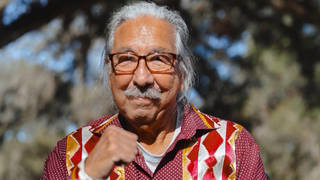

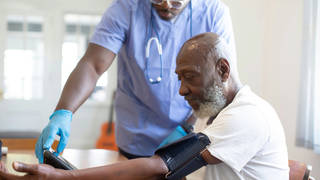
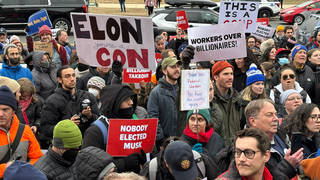





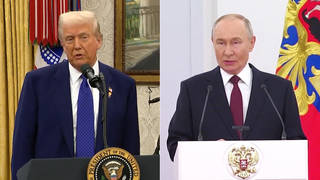
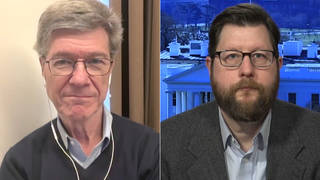
Media Options